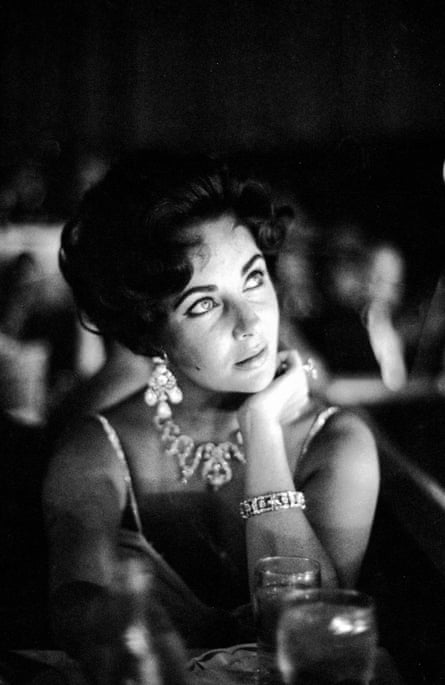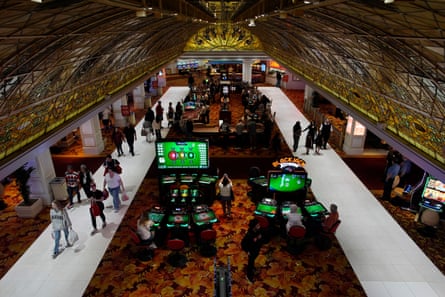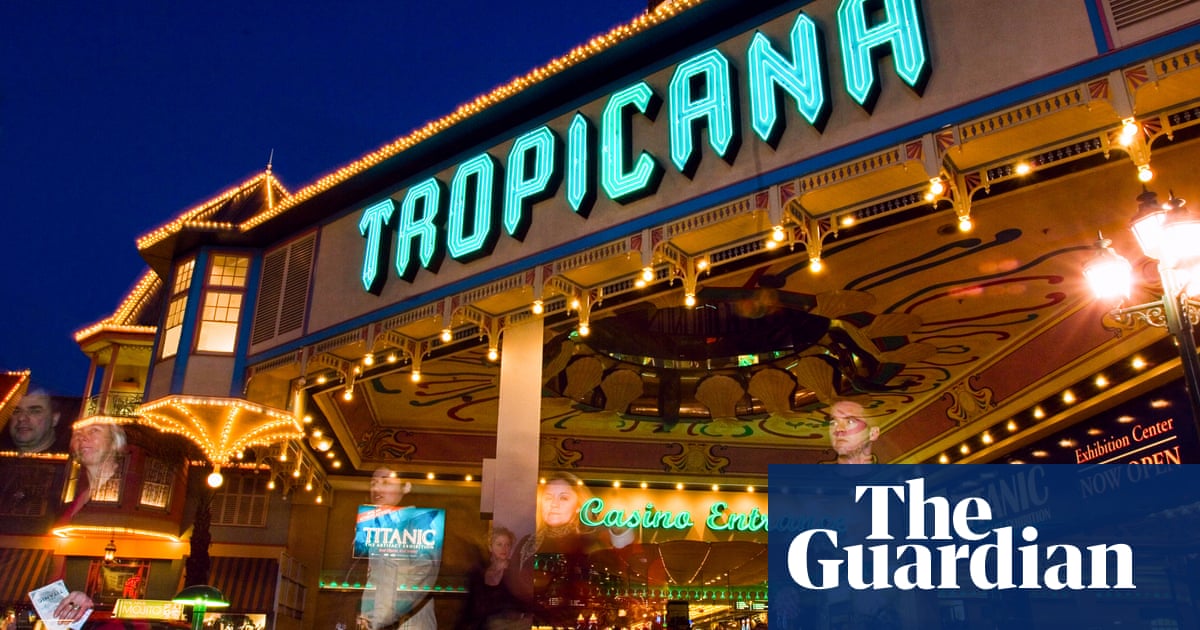
From Bond to bust: a Sin City hotel’s closing mirrors the new face of Vegas
Tropicana, once host to celebrities, criminals and 007, will be replaced by the city’s new focus of attraction, a sports stadium
Las Vegas’s famous Tropicana hotel is no more. Its guests were abruptly asked to leave earlier this month and its gold-domed casino closed – signaling the end of an icon of classic Sin City life where glamor, celebrity and crime seemed to go hand in hand.
Now the old building will be elaborately demolished with explosives – a tradition of Nevada’s desert gambling mecca – to make way for a sports stadium, symbolizing for many modern Vegas’s image of sanitized mass tourism.
Much ink has been spilled on end of the Tropicana, as if it had been imbued with gamblers’ ancestral spirits that could be summoned to speak to the time when it was skimmed by the nightclub manager and mafioso Joe Agosto for the benefit of the Kansas City mob, or when Louis Armstrong and Benny Goodman played residencies.
To others, it recalled an ageing Sean Connery, in his sixth turn as James Bond in Diamonds are Forever, meeting with doubles of his arch-enemy Blofeld atop the hotel. It was also the setting for a series of suggestive jokes about Bond’s assistant Plenty O’ Toole and a swimming pool fight with a pair of butch assassins, Bambi and Thumper.

Others recalled Showgirls, the not-quite cult 1995 Joe Eszterhas bomb, that was loosely based on the pink-themed Parisian feathered-showgirl cabaret import Folies Bergère, which ran for half a century at the Tropicana.
The Folies Bergère magician Lance Burton once recalled that during a Siegfried and Roy show a cheetah escaped into the orchestra pit, sending the musicians diving for cover. “And Siegfried said to the piano player, ‘Keep playing – he likes the music.’”
Then there is Elvis Presley – the singer played more than 600 shows in Vegas. “There was an old line that when Elvis played the Westgate, originally the International and then the Hilton, it was a great deal for the hotel because [his manager] Tom Parker lost most of what they paid Elvis back at the crap tables,” says Michael Green, a professor at the University of Nevada, Las Vegas, and city historian.
The site of the 1,500-room Tropicana – dubbed the “Tiffany of the strip” when it opened in 1957 – on Las Vegas Boulevard will be repurposed for a 33,000-seat, $1.5bn stadium housing the Oakland Athletics baseball team, set to open in four years. By the time the hotel closed on 2 April after 67 years, it was already significantly past its prime.
It had declared bankruptcy in 2008 and been sold several times, lastly for just $308m to Bally’s in 2022. “The Trop is obviously iconic, but it is, really, in a lot of ways, economically obsolete, the Bally’s chairman, Soo Kim, told the New York Times last year. “It literally is part of the glitz and glamor of Vegas, but it hasn’t been that for decades.”

After it was announced that the Tropicana was closing Vegas historians noted that most people do not come to the Strip expecting history, and even if they did it would not mean they wanted to experience as it was. Las Vegas is not positioned for nostalgia, and never has been, except perhaps as a sideline interest.
“In the days when the mob ran most of the casinos, most people thought of going to Las Vegas as a questionable act because of what they themselves might do there,” says Green. “Today, those acts are not questionable for the most part, but they come for a sign that the mob is still here.”
Looking for signs of history, then, is different from wanting to want to experience it. Vegas, says Green, never had a monopoly on questionable behavior, as the marketing tagline “what happens in Vegas, stays in Vegas” suggested, “but you could do it legally here”.
“The idea was that you could live in middle America and you wouldn’t necessarily want people to know that you had gone to this American Sodom – except that one of the big things was [people] sending photos back to their hometown paper accepting jackpots,” he says, outlining a deeply neurotic relationship between sin and virtue. Vegas is also the city that made watching nuclear tests a tourist attraction.
Bad behavior doesn’t necessarily remain in Vegas, as Prince Harry discovered in 2012 when compromising “lost weekend” photos were published (last month a former dominatrix and model, Carrie Royale, threatened to put more pictures on her OnlyFans page), or when the notorious morality tsar William Bennett was found to have large gambling debts.

Over the years, the Tropicana tried to evolve with Las Vegas. It went from Sin City glamor to family-friendly destination with giant buffet stations, a water park, flamingoes and a talking parrot to high-end, high-spending destination for lobster, champagne and big-name concerts (Adele, Lady Gaga, U2) and major sporting events. Last year, Vegas held its first F1 world championship race, in addition to having an NFL and NBA franchise.
The means of attraction may have shifted from the Tropicana’s showgirls and the talking parrot, but Vegas’s business focus remains solidly on gambling. In January, Nevada’s gaming control board said casinos statewide collected $15.5bn in gaming revenue in 2023, a 4.6% increase over 2022. Strip casinos reported a record $8.9bn in revenue – a 7.4% increase over 2022.
The late art critic Dave Hickey, a long term Vegas resident and enthusiast, asked if visitors were “being trained to worry about Vegas at the Fun-Police Academy or is it, perhaps, a self-selecting vocation?”

“If you take no pleasure in risking something of value on the chance of something more still, Vegas will be totally opaque to you so you should probably stay home,” he wrote in Frieze at the turn of the millennium, 22 years after Las Vegas lost its national monopoly on betting.
“Don’t come out here to Vegas and whine to me about global warming, existential despair, creeping totalitarianism, and proliferating late capitalism. I see the same world you do, so if you want to swim in this pond, take your measure, quote me some odds, pull out your bankroll and let’s fucking bet.”
When the Tropicana comes down in an coordinated series of explosions in October, it will be neither tragic or surprising, but a sign of Vegas’s continuing evolution, says Green.
“It’s a sign of how Las Vegas tries to reach and cater to customers, and that in turn is a sign of how much the country has changed. The idea of tearing something down is not new. Las Vegas rebrands itself now and then but does not necessarily change a lot about itself.”
